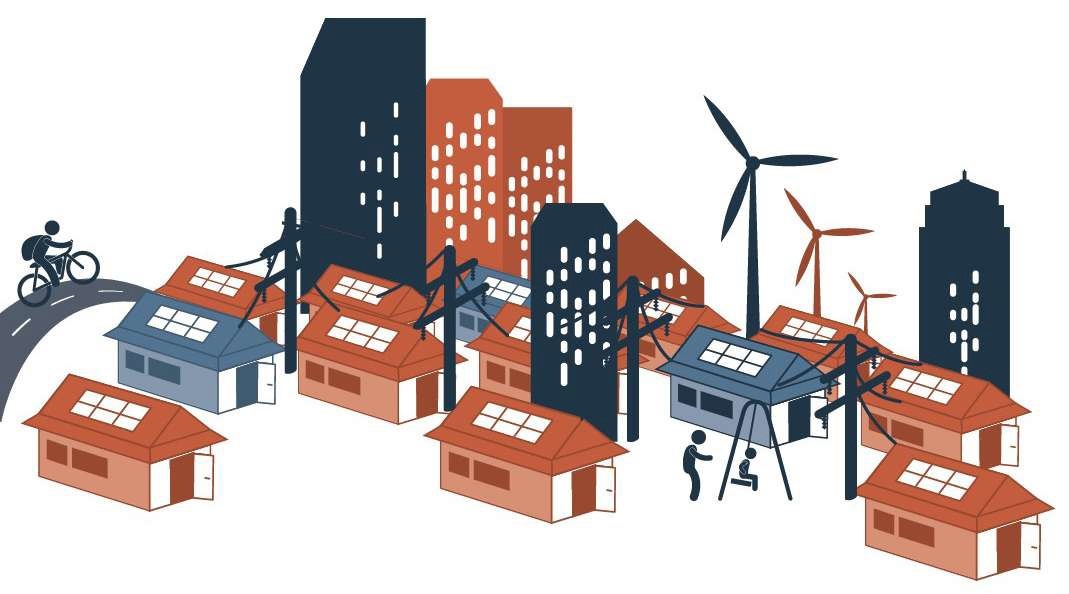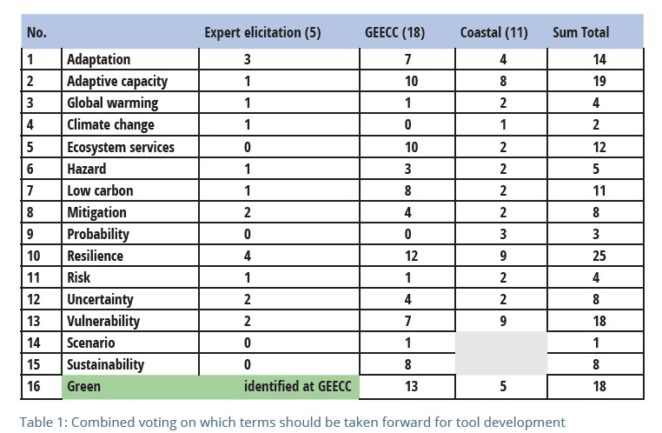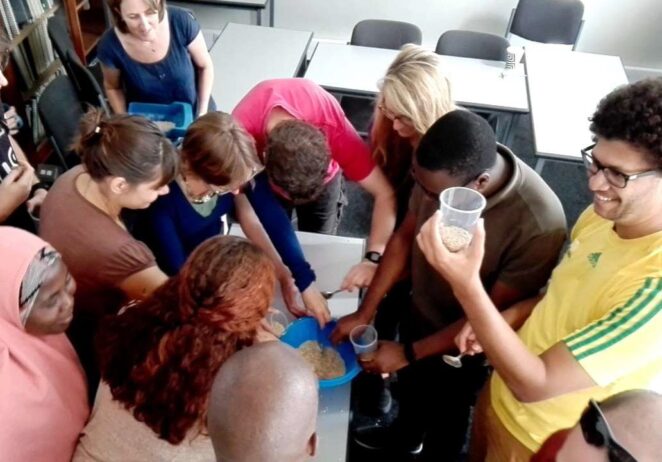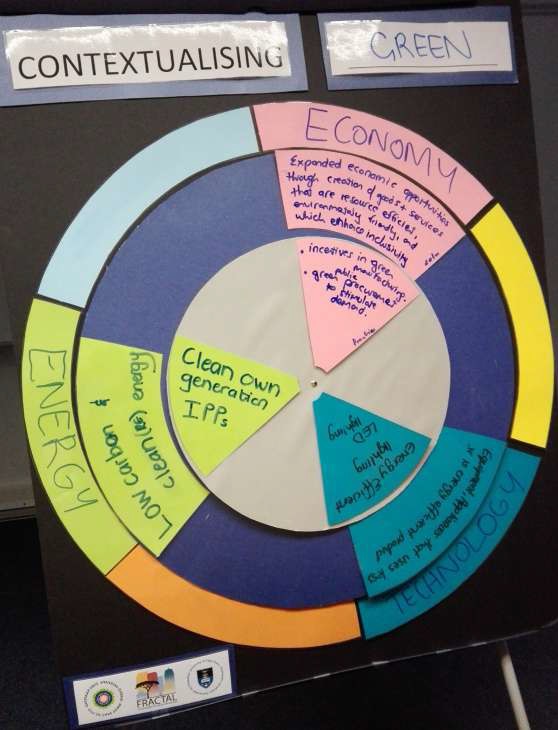Article /
Towards developing a common language for climate change in the City of Cape Town

Introduction
Ambiguity in the meaning of terms is common in the climate change field. There is differential use of language/terminology within a multidisciplinary user group, with the selection of terminology often presenting a barrier to broad engagement with climate change and development issues. This was particularly noted within the City of Cape Town as an impediment to moving forward with multidisciplinary climate change decisions within the City. Understanding terminology discrepancies and coming to a common meaning of terms, or at least making explicit the differential understandings, is fundamental to successful transdisciplinarity. You can read more about the vital principles of transdisciplinarity, co-production and co-exploration here.
In collaboration with the City of Cape Town, using the development of the City’s Climate Change Policy document and the Green Economy, Energy and Climate Change forum as a basis, this research aimed to engage in a transdisciplinary process to better understand and attempt to circumvent language discrepancies at a city scale.
This working paper* describes the processes undertaken and reports on the elucidated and nuanced understanding of the terminology discrepancies at play. The findings show two main kinds of discrepancies – conceptual and contextual – and that confusion around terms are a result of either or both categories. The paper provides a toolkit to better understand terminology barriers in the field of climate change and development while contributing to overcoming these barriers.
While this paper has been written to inform the FRACTAL project, its approaches and findings are relevant to those working in transdisciplinary settings in general.
If you would like to learn more about how to conduct a terminology co-exploration exercise for climate change adaptation decision-making (with tips for success and potential pitfalls to avoid), read this “how-to” article. To learn more about why co-exploring language and terminology is important for creating a level playing field at the beginning of a multi-stakeholder engagement, read this “explainer” article.
*Download the full publication from the right-hand column. A summary of the key messages from the working paper are provided below. See the full text for more details.
Methodology
- Embedded researcher: the primary mechanism for completing the research was through the placement of an embedded researcher into the City of Cape Town.
- Analysis of the Climate Change Policy and comments: the initial phase of the project entailed identifying “barrier” terms and their interpretations across sectors.
- Expert elicitation: These terms were then presented in one-on-one interviews with external experts. In addition to one-on-one interviews, an online survey was carried out.
- Co-exploration forums with city stakeholders:
- the first co-exploration at the Green Economy, Energy and Climate Change (GEECC) monthly committee meeting was used to explain the project, deepen our understanding of how these terms are both interpreted and used, and finalise which terms would be carried into the second phase of the project.
- in the second co-exploration forum at the City of Cape Town Coastal Working Group, participants were asked to vote on terms they would prioritise for tool development.
- Tool development and testing:a series of project team workshops were held with the objective of developing appropriate tools to address the top-ranking terms. Three tools were developed as a result of these workshops.
- Results dissemination: in the final stages of the project, a special meeting of the GEECC committee was called to disseminate the results of the project to the City.

Findings and products
The hypothesis on beginning this project is that the barrier posed by climate change terminology is a result of conceptual misunderstandings of the terms. But the findings show two main kinds of discrepancies – conceptual and contextual.
Conceptual discrepancies
- Confusion around the meaning of terms occurs as a result of conceptual differences arising from formulations that best suit the relevant disciplines.
- A participant highlighted that some terms which might be considered quite distinct in many cases are at times used synonymously in order to entice engagement from otherwise disinterested parties. As a result, practitioners tend to use the term interchangeably to promote engagement.
- In other instances, conceptual confusion results from a poor understanding of the term, rather than differing definitions.
Contextual discrepancies
- The concept of working towards a common meaning is reinforced in the results of this project which shows that, in some cases, participants have very different meanings when a particular term is applied in a sectoral context other than their own.
- When there are contextual terminology discrepancies, users are often completely unaware that terms are being used to mean different things across multidisciplinary groups.
- Some terms are not as well understood and relate to more complex problems. Many climate related terms refer to emerging concepts and practices. As such, officials are likely still in the process of defining and applying them within their own contexts.
- Importantly, while fewer than anticipated terms showed conceptual barriers, many of them showed contextual ones.
- It was noted that there is often a combination of conceptual and contextual barriers at work.
Tools for addressing terminology barriers
As a result of this research, three stand-alone tools were developed which aim to address these terminology discrepancies and unpack them further, in an effort to move toward a common understanding.
- The first tool, Spilling the Beans, is a game that addresses discrepancies in the conceptual understanding of the term ‘resilience’.
- The second tool is an e-learning module aimed at deepening understanding of poorly understood terms, namely: adaptation and adaptive capacity.
- The third tool, named the Wheel of Context is an activity that addresses both contextual and conceptual discrepancies for any term.
Each tool has the potential to be transferable across all cities in the FRACTAL project.


Recommendations
This project has highlighted that there are terminology nuances to working within a transdisciplinary space that were perhaps previously overlooked. In this regard, the FRACTAL team and others working in transdisciplinary settings should be especially alert to the potential for less obvious contextual discrepancies introduced in multi-disciplinary groupings.
At a fundamental level, the terms identified through the project will have common problems across all FRACTAL cities. Recommended tasks/activities for upcoming work:
- Integrating the wheel of context into learning lab activities
- Development of further e-learning modules
- Integrating “Spilling the beans” into capacity development activities
- Development of a FRACTAL reflective piece on the challenges of embedded research
- Integration of City of Cape Town as a self-funded city
Please refer to the full document for more details on lessons learned, reflections on the embedded researcher process, study limitations and further research.
This working paper was written by Anna Steynor (Head of Climate Services/Science Engagement Lead, Climate Systems Analysis Group, University of Cape Town) and Jessica Lee (City of Cape Town Embedded Researcher).
Suggested citation
Steynor, A., and Lee, J. (2017) Towards developing a common language for climate change in the City of Cape Town. FRACTAL Working Paper #6. University of Cape Town, Cape Town, South Africa
Related Articles
- FRACTAL project website
- FRACTAL: Future Resilience for African Cities and Lands
- Co-producing climate knowledge – Great in theory, but how about practice?
- Africa's Climate: Helping decision-makers make sense of climate information
- Learning Labs in Windhoek: creating collaborative ways to address climate change in African cities
- An Embedded Researcher approach to integrate climate information into decision making in southern African cities
- Transdisciplinarity, co-production, and co-exploration: integrating knowledge across science, policy and practice in FRACTAL
- “How-to” Guide: Co-exploring Terminologies
- "Explainer" Guide: Co-exploring Terminologies
